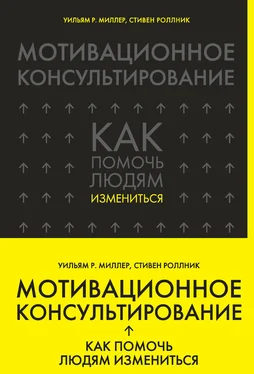Mitcheson, L., Bhavsar, K., & McCambridge, J. (2009). Randomized trial of training and supervision in motivational interviewing with adolescent drug treatment practitioners. Journal of Substance Abuse Treatment, 37(1), 73–78.
Mounsey, A. L., Bovbjerg, V., White, L., & Gazewood, J. (2006). Do students develop better motivational interviewing skills through role-play with standardized patients or with student colleagues? Medical Education, 40 (8), 775–780.
Moyers, T. B., Manuel, J. K., Wilson, P. G., Hendrickson, S. M. L., Talcott, W., & Durand, P. (2008). A randomized trial investigating training in motivational interviewing for behavioral health providers. Behavioural and Cognitive Psychotherapy, 36(2), 149–162.
Moyers, T. B., Martin, T., Manuel, J. K., Hendrickson, S. M., & Miller, W. R. (2005). Assessing competence in the use of motivational interviewing. Journal of Substance Abuse Treatment, 28(1), 19–26.
Opheim, A., Andreasson, S., Eklund, A. B., & Prescott, P. (2009). The effects of training medical students in motivational interviewing. Health Education Journal, 68(3), 170–178.
Periasamy, S. (2005). The relationship between the fidelity of motivational interviewing and nutritional outcomes in African American church populations. Unpublished doctoral dissertation, Georgia State University, Atlanta.
Poirier, M. K., Clark, M. M., Cerhan, J. H., Pruthi, S., Geda, Y. E., & Dale, L. C. (2004). Teaching motivational interviewing to first-year medical students to improve counseling skills in health behavior change. Mayo Clinic Proceedings, 79(3), 327–331.
Rollnick, S., Kinnersley, P., & Butler, C. (2002). Context-bound communication skills training: Development of a new method. Medical Education, 36 (4), 377–383.
Roman, B., Borges, N., & Morrison, A. K. (2011). Teaching motivational
interviewing skills to third-year psychiatry clerkship students. Academic Psychiatry, 35(1), 51–53.
Rubak, S., Sandbaek, A., Lauritzen, T., Borch-Johnsen, K., & Christensen, B. (2006). An education and training course in motivational interviewing influence: GPs’ professional behaviour – ADDITION Denmark. British Journal of General Practice, 56(527), 429–436.
Rubel, E. C., Sobell, L. C., & Miller, W. R. (2000). Do continuing education workshops improve participants’ skills? Effects of a motivational interviewing workshop on substance-abuse counselors’ skills and knowledge. Behavior Therapist, 23(4), 73–77, 90.
Runkle, C., Osterholm, A., Hoban, R., McAdam, E., & Tull, R. (2000). Brief negotiation program for promoting behavior change: The Kaiser Permanente approach to continuing professional development. Education for Health, 13(3), 377–386.
Scal, P., Hennrikus, D., Ehrlich, L., Ireland, M., & Borowsky, I. (2004). Preparing residents to counsel about smoking. Clinical Pediatrics, 43(8), 703–708.
Schoener, E. P., Madeja, C. L., Henderson, M. J., Ondersma, S. J., & Janisse, J. J. (2006). Effects of motivational interviewing training on mental health therapist behavior. Drug and Alcohol Dependence, 82(3), 269–275.
Schumacher, J. A., Madson, M. B., & Norquist, G. S. (2011). Using telehealth technology to enhance motivational interviewing training for rural substance abuse treatment providers: A services improvement project. Behavior Therapist, 34 (4), 64–70.
Sepulveda, A. R., Lopez, C., Macdonald, P., & Treasure, J. (2008). Feasibility and acceptability of DVD and telephone coaching-based skills training for carers of people with an eating disorder. International Journal of Eating Disorders, 41(4), 318–325.
Shafer, M. S., Rhode, R., & Chong, J. (2004). Using distance education to promote the transfer of motivational interviewing skills among behavioral health professionals. Journal of Substance Abuse Treatment, 26(2), 141–148.
Smith, J. L., Amrhein, P. C., Brooks, A. C., Carpenter, K. M., Levin, D., Schreiber, E. A., et al. (2007). Providing live supervision via teleconferencing improves acquisition of motivational interviewing skills after workshop attendance. American Journal of Drug and Alcohol Abuse, 33(1), 163–168.
Sobell, L. C., Manor, H. L., Sobell, M. B., & Dum, M. (2008). Self-critiques of audiotaped therapy sessions: A motivational procedure for facilitating feedback during supervision. Training and Education in Professional Psychology, 2(3), 151–155.
Sdderlund, L. L. (2008). Learning motivational interviewing: Exploring primary health care nurses’ training and counselling experiences. Health Education Journal, 67(2), 102–109.
Sdderlund, L. L., Madson, M. B., Rubak, S., & Nilsen, P. (2011). A systematic review of motivational interviewing training for general health care practitioners. Patient Education and Counseling, 84(1), 16–26.
Sdderlund, L. L., & Nilsen, P. (2009). Feasibility of using motivational interviewing in a Swedish pharmacy setting. International Journal of Pharmacy Practice, 17(3), 143–149.
Stott, N. C. H., Rees, M., Rollnick, S., Pill, R. M., & Hackett, P. (1996).
Professional responses to innovation in clinical method: Diabetes care and negotiating skills. Patient Education and Counseling, 29 (1), 67–73.
Tober, G., Godfrey, C., Parrott, S., Copello, A., Farrin, A., Hodgson, R., et al. (2005). Setting standards for training and competence: The UK alcohol treatment trial. Alcohol and Alcoholism, 40(5), 413–418.
van Eijk-Hustings, Y. J., Daemen, L., Schaper, N. C., & Vrijhoef, H. J. (2011). Implementation of motivational interviewing in a diabetes care management initiative in the Netherlands. Patient Education and Counseling, 84(1), 10–15.
Velasquez, M. M., Hecht, J., Quinn, V. P., Emmons, K. M., DiClemente, C. C., & Dolan-Mullen, P. (2000). Application of motivational interviewing to prenatal smoking cessation: Training and implementation issues. Tobacco Control, 9 (Suppl. 3), iii36–iii40.
Villaume, W. A., Berger, B. A., & Barker, B. N. (2006). Learning motivational interviewing: Scripting a virtual patient. American Journal of Pharmaceutical Education, 70(2), 33.
White, L. L., Gazewood, J. D., & Mounsey, A. L. (2007). Teaching students behavior change skills: Description and assessment of a new motivational interviewing curriculum. Medical Teacher, 29(4), e67–e71.
Wilson, G. T., & Schlam, T. R. (2004). The transtheoretical model and motivational interviewing in the treatment of eating and weight disorders. Clinical Psychology Review, 24(3), 361–378.
Исследование процесса
Amrhein, P. C., Miller, W. R., Yahne, C., Knupsky, A., & Hochstein, D. (2004). Strength of client commitment language improves with therapist training in motivational interviewing. Alcoholism: Clinical and Experimental Research, 28(5), 74A.
Amrhein, P. C., Miller, W. R., Yahne, C. E., Palmer, M., & Fulcher, L. (2003). Client commitment language during motivational interviewing predicts drug use outcomes. Journal of Consulting and Clinical Psychology, 71(5), 862–878.
Baer, J. S., Beadnell, B., Garrett, S. B., Hartzler, B., Wells, E. A., & Peterson, P. L. (2008). Adolescent change language within a brief motivational intervention and substance use outcomes. Psychology of Addictive Behaviors, 22(4), 570–575.
Barsky, A., & Coleman, H. (2001). Evaluating skill acquisition in motivational interviewing: The development of an instrument to measure practice skills. Journal of Drug Education, 31(1), 69–82.
Boardman, T., Catley, D., Grobe, J. E., Little, T. D., & Ahluwalia, J. S. (2006). Using motivational interviewing with smokers: Do therapist behaviors relate to engagement and therapeutic alliance? Journal of Substance Abuse Treatment, 31(4), 329–339.
Читать дальше
Конец ознакомительного отрывка
Купить книгу












